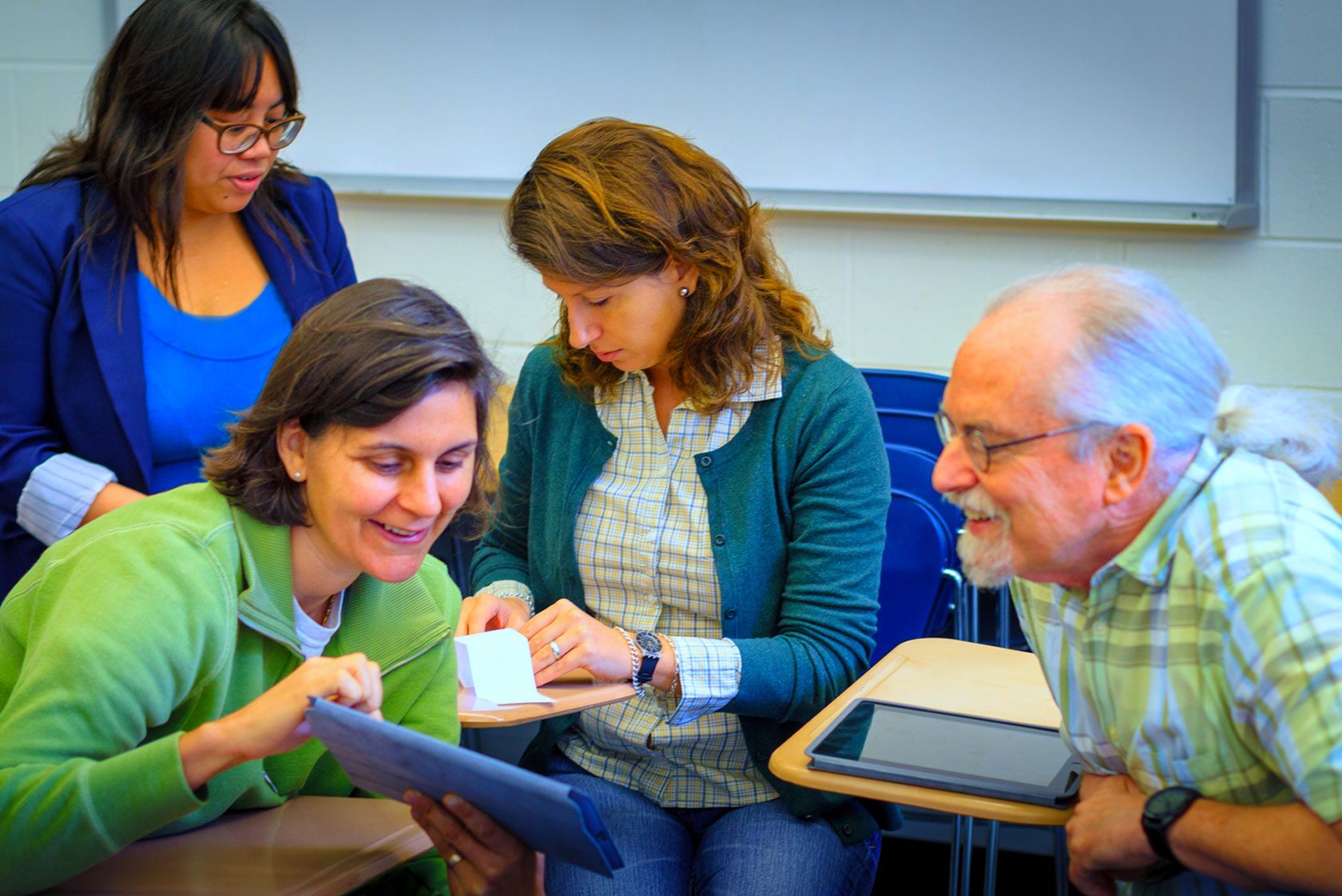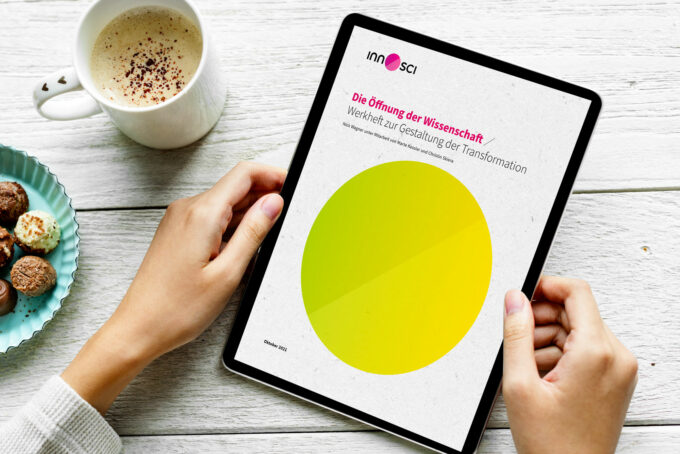
Working Out Loud: How to Promote Digital Collaboration and Open Science
Working Out Loud promotes networking and collaboration. It is therefore predestined for use in the context of open science. Starting points for its application in the course of the opening of science and for digital collaboration in libraries are examined in the blog post.
Working Out Loud (WOL) is a method that promotes networking and purposeful collaboration. It was developed by John Stepper and is described in his book Working Out Loud: For a Better Career and Life.
Working Out Loud is an approach to systematically build relationships that can be helpful in one way or another, for example to achieve a goal or to familiarize oneself with a new topic. Working Out Loud thus promotes working in networks, which is possible nowadays thanks to social networks but which is also required. It thus represents a suitable social and organisational response to digitisation and supports the learning of digital collaboration.
Working Out Loud as a central skill for digital workplaces
One of the elements of WOL is to make your own work steps visible in digital media, especially on Twitter (#WOL). Thus, not only the results of one’s own work are published, but also the path towards one’s goals is communicated. This is associated with an increased visibility of one’s own work and the hope for feedback, which leads to its improvement and the establishment of networks. In particular, interdisciplinary relationships and cooperation can also benefit. At the same time, WOL is a method that enables joint learning, personal development as well as group development.
You contribute to building and strengthening relationships by considering what valuable contributions you can make to others, such as sharing your own work experiences with them. WOL is therefore not only a method and behaviour, but also an attitude. This creates connections and trust which form a basis for cooperation and collaboration.
Your own work becomes more effective with WOL because you have access to more people and other opportunities that can help you. The larger network also makes you feel more connected and more competent and it helps you to find out even more about what you want and what you can offer to others.
Working Out Loud: Helpful for Open Science?!
Working Out Loud is therefore also well suited for opening up science, both at the individual level and at the level of the Open Science movement.
Researchers or libraries could therefore practice open science with the WOL approach. This includes not only publishing your own research results for example in blog posts or tweets, but also reporting on goals and work steps right from the start.
A pleasant side effect of the Working Out Loud approach: It forces people to communicate in an understandable way in order to reach different stakeholders and thus opens up discussions (Link in German). This can create new starting points for citizen science.
Working Out Loud could also unfolds its valuable potential for building bridges and creating understanding between researchers, libraries and open science sponsors as well as infrastructure developers. Thus it can contribute to the required bridging between the areas. In this respect, Working Out Loud represents a valuable approach for a stronger implementation of Open Science.
Working Out Loud in organizations
WOL could be useful for the development and networking inside and outside of libraries. WOL represents an opportunity to network better within the organization, to prevent silos and to overcome departmental boundaries in order to work together more and better. The knowledge available within the organisation becomes better accessible. Employees are given the opportunity to become more involved and to develop their intrinsic motivation.
This almost inevitably results in more agility, innovation and collaboration in the organization; an organizational change that is fun. WOL also helps organisations to better adapt to the VUCA world by fostering an appropriate organizational culture and learning culture. Large companies such as Bosch, Continental and Siemens are already successfully using WOL for this purpose.
Q1 Blogging about the Library experience, sharing ideas and collaborating online has made me a better librarian and therefore has made the library better. Reflecting on what you do is essential in my opinion if you’re going to make changes that mean anything. #uklibchat
— Lucas Maxwell (@lucasjmaxwell) 5. Februar 2018
Working Out Loud can also make libraries and their employees more visible in social media.
Getting started systematically with Working Out Loud Circles
To get started with Working Out Loud you can read the book Working Out Loud: For a Better Career and Life, visit the website workingoutloud.com and watch a TEDx Talk by John Stepper.
There are also WOL communities on Facebook and LinkedIn and it is possible to contact John Stepper via twitter.
As a first step, the establishment of or the participation in a Working Out Loud Circle are recommended. The circles were designed for an entry into WOL with mutual support. A Working Out Loud Circle runs for twelve weeks by default. At weekly 60-minute meetings you meet three or four other members of the circle and practice Working Out Loud together hands-on. Thanks to existing circle guidelines, which describe the course of the meetings, the circle can be started directly.
Each participant of the circle defines an individual goal at the beginning. Over the twelve weeks you build relationships that can help you achieve this goal through the expertise and ideas of others. With the help of short practical exercises you learn how to establish these relationships. At the end of the time all participants have a larger and more diverse network, which consists of people who help you on your way towards your own goal. Above all, you will have learned a behaviour that you can apply to any goal. And there will be opportunities that you wouldn’t even have imagined before.
The weekly circle meetings can be held in person on site or via video conference, independent of organisations as well as within an organisation. The content of the meetings is confidential. But there are also first examples of public Working Out Loud Circles (Link in German), which use this as a method of joint learning.
Digital Collaboration in Libraries and for Open Science
In the end, Working Out Loud means that three fundamental questions are constantly being clarified:
- What do I want to achieve?
- Who has something to do with my goal?
- What can I contribute for other people to strengthen our relationship?
This clarity and the new networks promote digital collaboration in libraries, in science and in the sense of open science, as well as Working Out Loud already does in large corporations which practice it.
Who already uses Working Out Loud to specifically strengthen Open Science? Who knows examples of libraries, infrastructure or scientific organisations that have Working Out Loud Circles? We look forward to receiving your comments.
Further information:
- Working Out Loud Website
- #WOL on Twitter
- Circle Guidelines
- Working Out Loud: The making of a movement, John Stepper at TEDx Navesink (youtube video)
View Comments

Open Science Conference 2018: Going into Practice!
The latest developments in science policy, hands-on examples from scientific...



